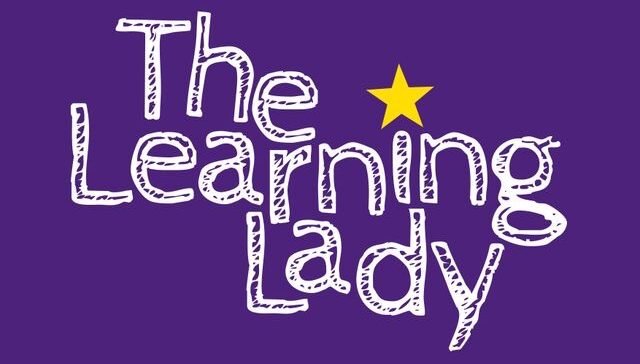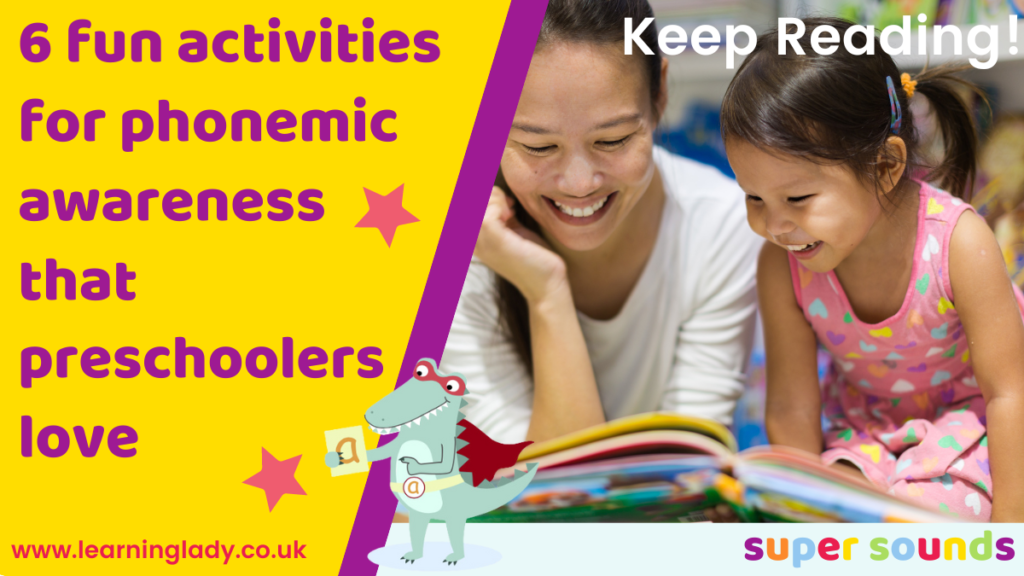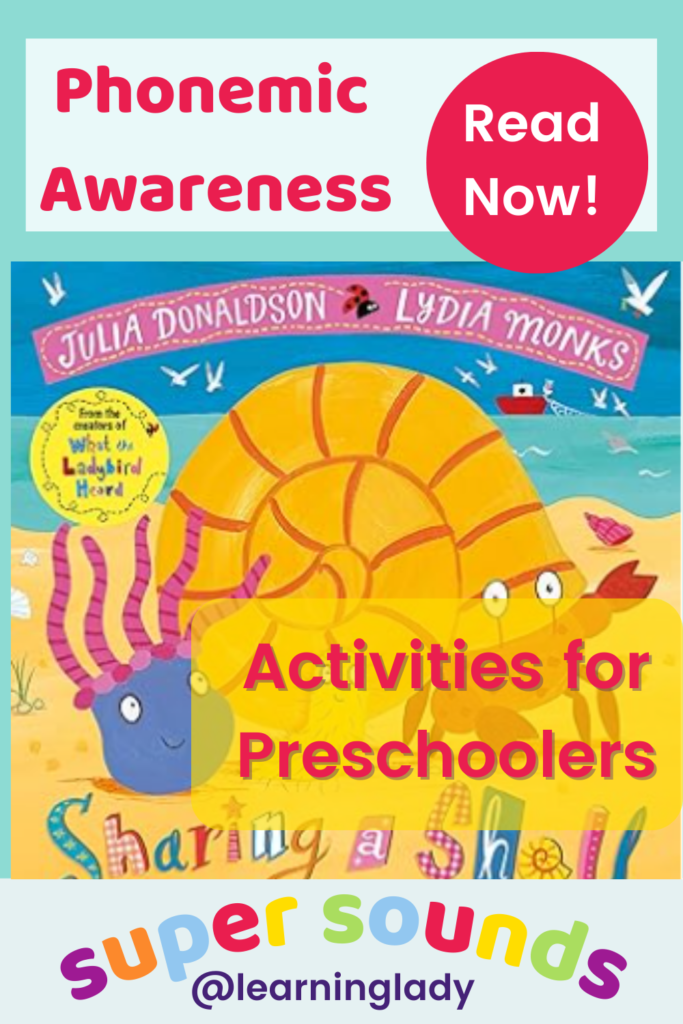Activities for phonemic awareness are the perfect way to prepare preschoolers for any approach to phonics teaching.
This easy peasy collection early years activities achieves amazing results, with next to no prep time. Perfect for developing prephonics skills with preschoolers at home and nursery.
If you’re looking for fun and interactive ways to prepare your 3- and 4-year-olds for reading spectacularly well, look no further!
What is phonemic awareness?
Phonics is a system that teaches children to read by matching spoken sounds to written letters.
Once corresponding letters are introduced, spoken sounds are blended together to read whole words.
The same words are broken into segments of spoken sounds for spelling.
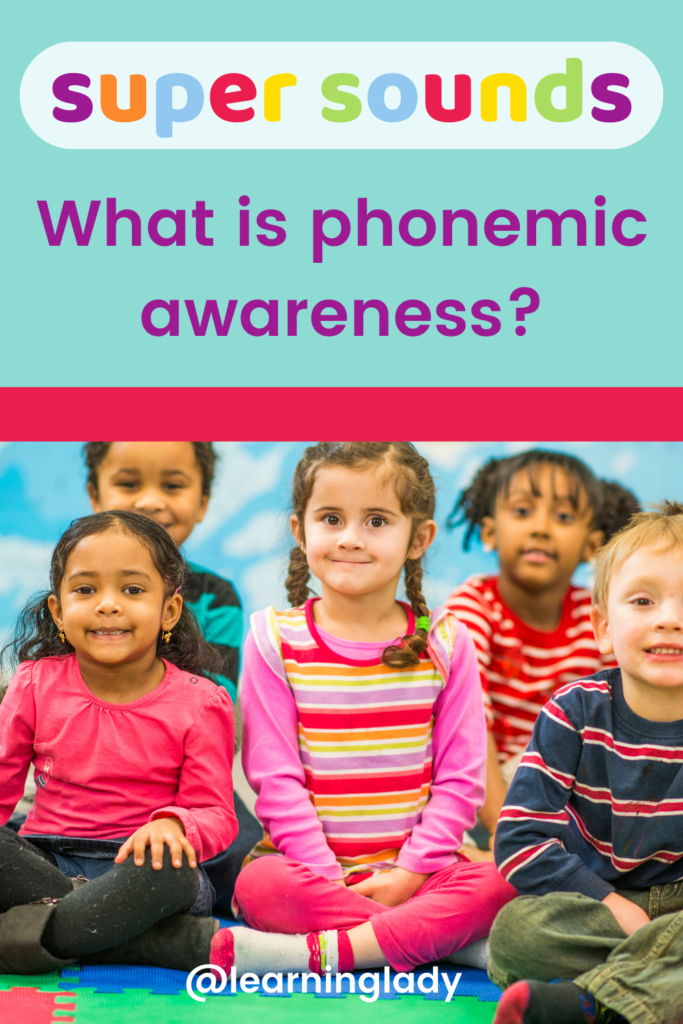
Being able to hear, say, and manipulate spoken sounds is therefore a critical first step to success in reading. This is where developing phonemic awareness comes in.
Phonemic awareness is not the same as phonics
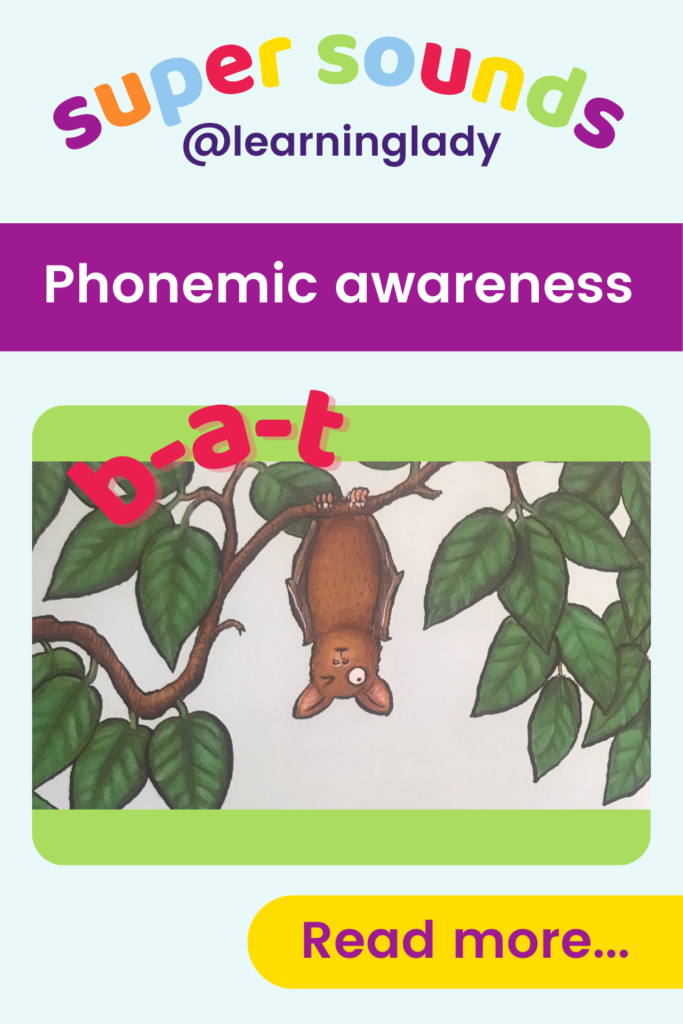
Phonemic awareness is the essential developmental stage to be mastered before phonics. It involves an understanding that all words are made up of separate spoken sounds (known as phonemes), before the added complication of letters is introduced..
Phonemic awareness develops the auditory skills of listening to and remembering spoken sounds in order, ready for processing words when formal phonics teaching begins.
By engaging in a variety of phonemic awareness activities, preschoolers hear, identify, and manipulate individual spoken sounds in words more easily.
Why phonemic awareness is important
Wondering why phonemic awareness is important for developing proficient readers and writers?
Research and classroom-based case studies consistently demonstrate a strong link between phonemic awareness and success in reading and writing later.
Well-developed phonemic awareness prevents overwhelm when letters are introduced because learning how to hear and order spoken sounds has already been established.
When children have a strong grasp of phonemic awareness, they are better equipped to connect the letters they see, with the sounds they hear.
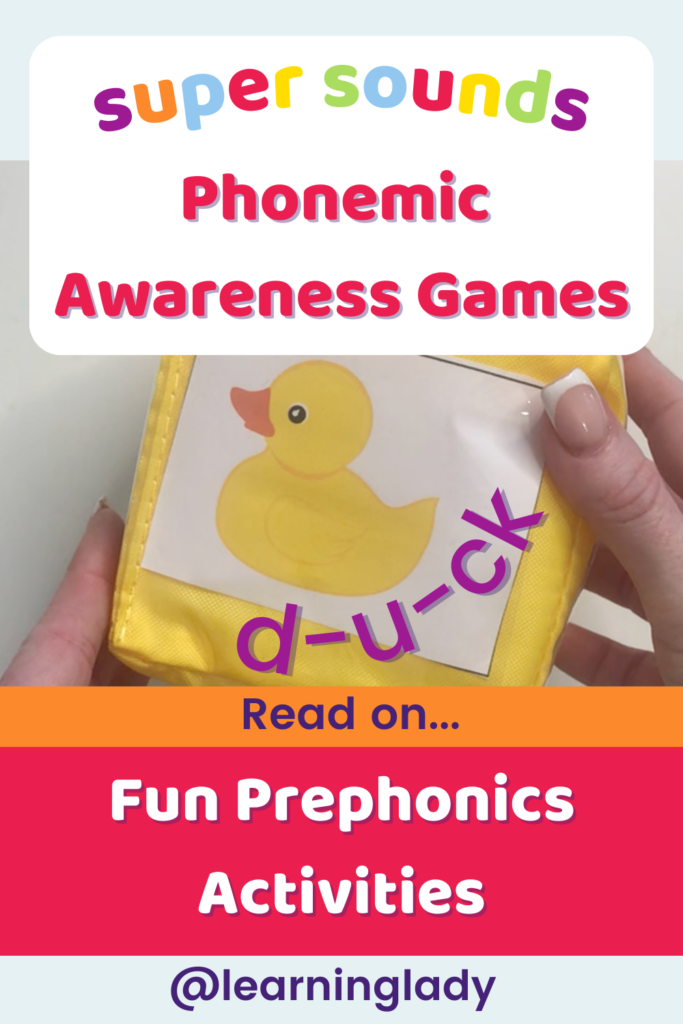
When firm prephonic foundations like these are not secured, learning to read and spell fluently can become difficult. This means that early readers are more likely to struggle
A progression of phonemic awareness skills, ready for reading…
- I join in with tongue twisters and games where 2 or 3 words begin with the same spoken sounds-
- I remember and say two alliterative words that describe an object in a story, song or game.
- I spot when words don’t begin with the same spoken sounds, and when they do.
- I join in with oral blending and segmenting activities to break words up and put them back together.
- I hear and remember the separate spoken sounds in words, orally blending these together to say whole words matched to objects or pictures.
- I say the separate spoken sounds in words, orally segmenting these by breaking up whole words matched to objects or pictures.
Are our children ready for phonemic awareness games?
So how do you know if your 3- and 4-year-olds are ready for phonemic awareness games?
What does success in phonemic awareness look like and what are the developmental steps preschoolers need to achieve?
If you find yourself asking these questions then this instantly downloadable progression assessment tool will set you up for success.
You’ll be able to instantly pinpoint where each of the children needed to start, by identifying what they can do, and what the next steps might be.
This is a tracker that highlights all of the prephonic steps your children will need to develop, so begin at Step 1and look out for areas of difficulty.
Phonemic awareness falls into the Step 5 and Step 6 categories on this tracker.
Phonemic awareness activities for preschoolers
Some of the best phonemic awareness activities for preschoolers include developing an awareness of alliteration.
These help 3- and 4-year-olds hear similarities in sounds at the beginning of words.
This is the first step to securing phonemic awareness.
3 and 4 year olds will struggle to hear and say all the separate spoken sounds in words if they can’t first hear these similar sounds at the beginning.
Phonics for 3 year olds
This essential phonics for 3-year-olds is more than simply making a list of words beginning with the same spoken sound.
Alliteration involves describing objects using two words beginning with the same spoken sound. This helps preschoolers hear the similarities in initial sounds more easily.
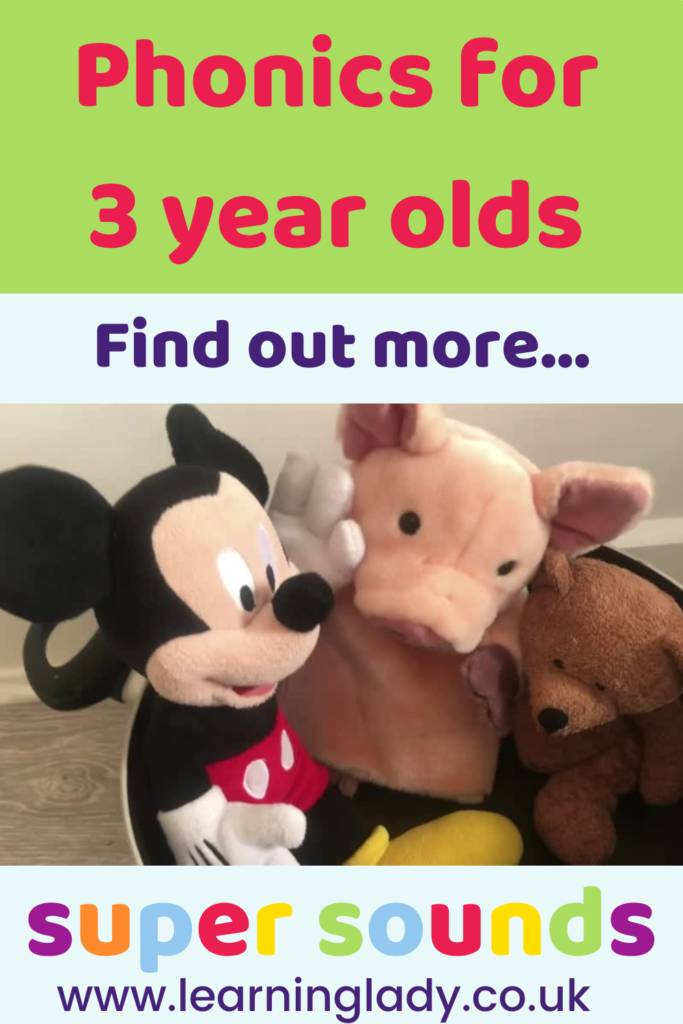
Alliterative phrases provide super successful opportunities to exercise the mouth muscles, introducing new language in a meaningful way too.
Best books to support phonics for 3 year olds
Alliteration is often used in picture books for young children because the language play successfully draws them in. A super simple start to developing phonemic awareness through stories.
Titles like Sharing a Shell or The Squirrels Who Squabbled simply roll off the tongue and are fun to say if you’re 3 or 4!
All preschoolers need access to stories that demonstrate alliteration. They provide relaxed, repeated practise and extended language play with alliterative phrases.
Here are some brilliant books to get you started…
Tongue Twisters | An easy peasy phonemic awareness activity
Early Years Tongue Twisters
It can be challenging to find the right kind of tongue twisters for early years children. Many of the traditional ones like ‘She Sells
Seashells on the Seashore’ are too long, too complicated, or just not interesting to early years children.
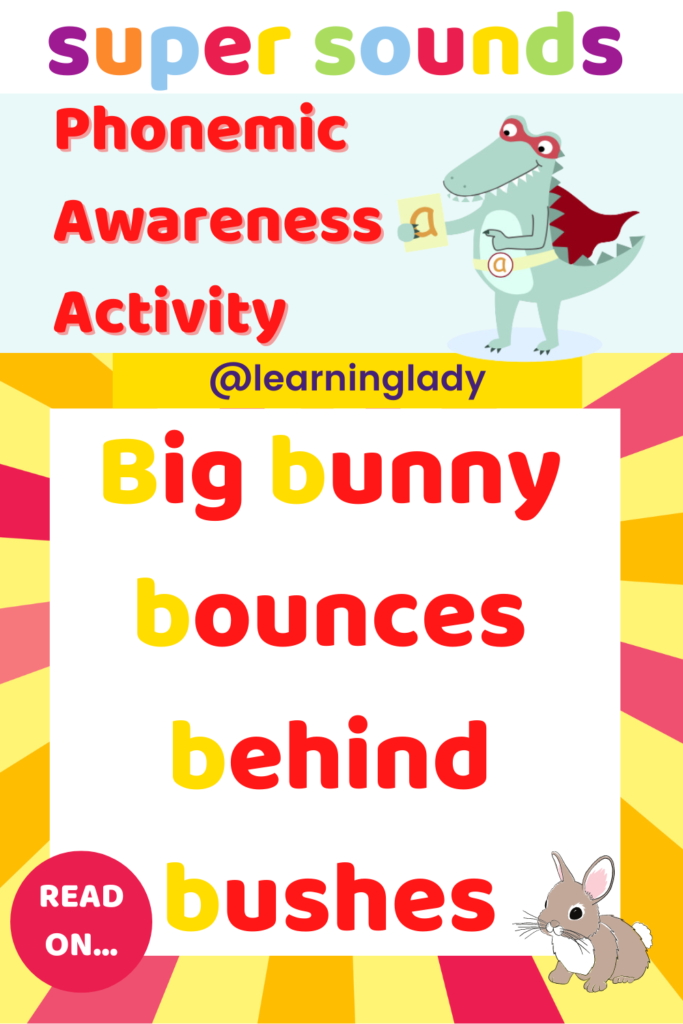
Begin with simple and relevant two- or three-word alliterative phrases, introducing greater complexity to build preschoolers phonemic awareness step by step.
Join in with these phase 1 phonics tongue twisters!
Prephonics activities that build bigger brains
Prephonics activities like tongue twisters don’t just develop an awareness of alliteration.
Tongue twisters build auditory memory; the ability to remember a sequence of words in order.
This ability to ‘hold a sentence’ in the working memory is a key learning muscle to develop, ready for reading and writing in school. Tongue twisters can help to build this learning muscle.
It’s hard for early years children to write a sentence when they’ve forgotten what they’re trying to write. Or sometimes they get halfway through a sentence without remembering the words they’ve read
More phase 1 phonics tongue twisters to develop alliteration at home or Nursery
Letters and Sounds Phase 1 activities for phonemic awareness
Letters and Sounds phase 1 activities that develop phonemic awareness can be great fun to play in small groups. They’re a great way of introducing similarities and differences in spoken sounds at the beginning of words through fun and engaging language play. Here’s a super simple sound sorting game to try, with just a bag of shopping!
Fun phase 1 phonics game for developing alliteration
Once you get started with developing phonemic awareness through an awareness of alliteration, you’ll be surprised by the range of everyday resources you can use.
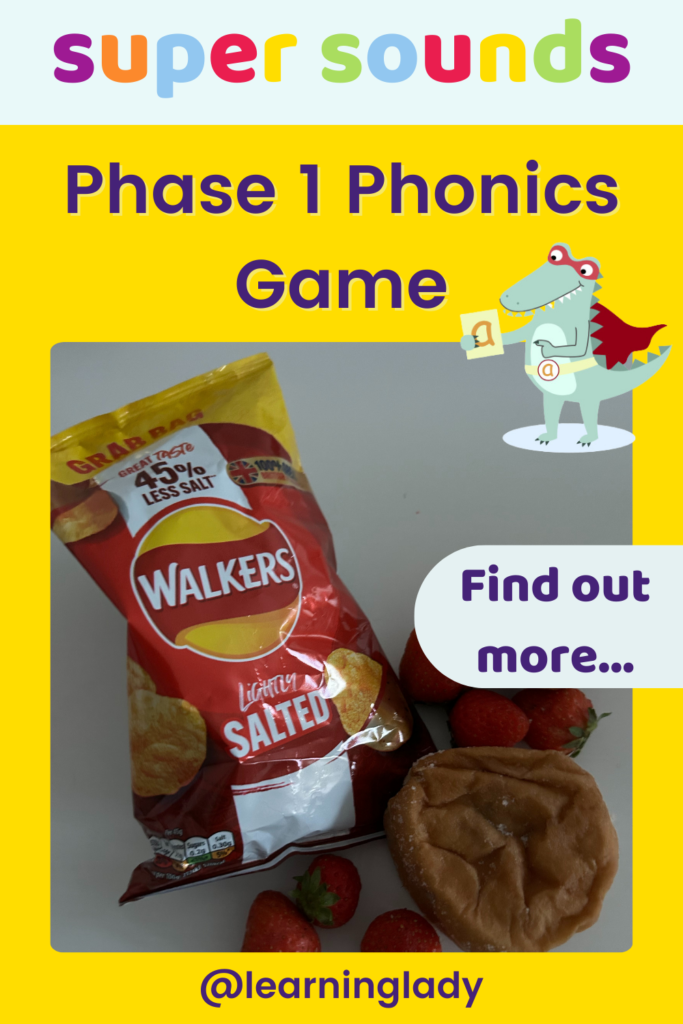
Using everyday objects or toys for activities for phonemic awareness for preschoolers can be super successful because….
- Your children will be able to build better links between prephonics skills and their everyday lives.
- You’ll reduce preparation time down to zero!
Here we were playing an alliteration picnic with:
- Crunchy crisps
- Sweet strawberries
- A delicious doughnut
- A pork pie
What would you take on an alliteration picnic?
Phase 1 phonics planning for phonemic awareness made easy!
Here’s another super speedy game to add to your phase 1 phonics planning for preschoolers.
In this example we used alliterative items including Mickey Mouse, a Pink Pig and a Brown Bear, but you can get creative and use any toys that you have.
Fun phase 1 phonics game for developing phonemic awareness
This phase 1 phonics game is fun to play and develops a sense of phonemic awareness fast! We used Hippo Has a Hat by Julia Donaldson as a starting point for this game, but the options are endless.
If your preschoolers have enjoyed playing these activities for phonemic awareness and you want to continue the prephonics fun, then Super Sounds is just what you need!
It’s an evidence based, tried and tested full prephonics programme that is designed specifically for 2,3 and 4 year olds.
Perfect for using before any phonics programme, Super Sounds is uniquely written for a fun and engaging approach to teaching a progression of prephonic skills step by step.
Whether you want fresh ideas as an alternative to Phase 1 Phonics, or you’re new to phonics in nursery and don’t know where to start, Super Sounds is waiting just for you.
Need more phonemic awareness games for Phase 1 Phonics?
Phonemic awareness games don’t just stop at developing an awareness of alliteration.
Once this prephonics step has been mastered, preschoolers need to learn to hear, say and isolate all the separate spoken sounds in words.
They do so by developing skills of oral blending and segmenting.
This blog explains everything you need to know about oral blending and segmenting in preschool, including 6 super speedy activities that you can get started with straightaway!
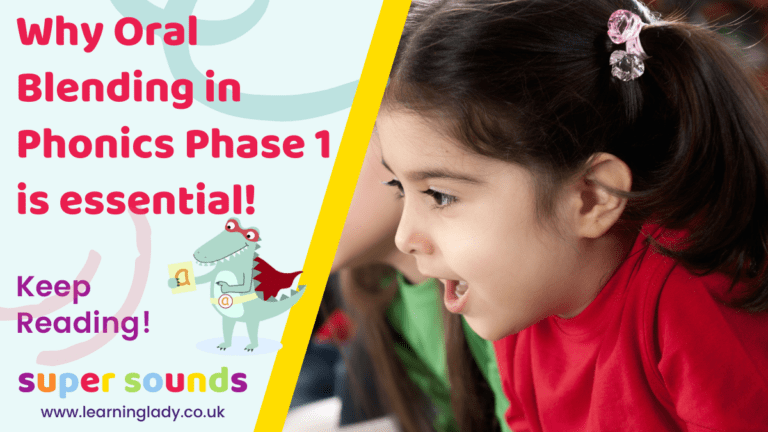
Even more activities for phonemic awareness with preschoolers…
Super Sounds by The Learning Lady
Ready for Reading – Preschool Online Training Course
FREE Recommended Reading books for Preschool Phonics
Teaching Phonics in Nursery? A fast alliteration game for developing phonic awareness
An easy winter activity for preschool for developing phonemic awareness
What comes before Phonics by Sally Neaum
